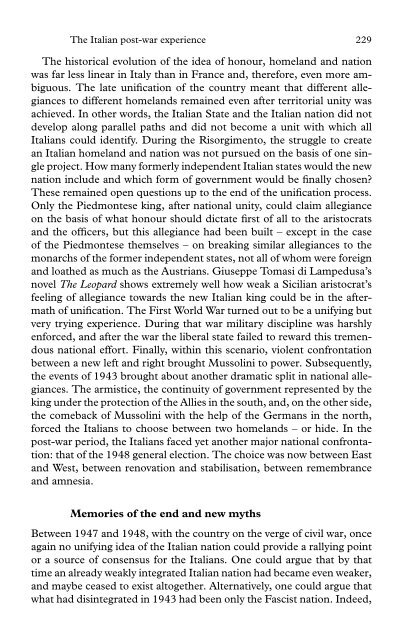Memory and Power in Post-War Europe: Studies in the Presence of ...
Memory and Power in Post-War Europe: Studies in the Presence of ...
Memory and Power in Post-War Europe: Studies in the Presence of ...
Create successful ePaper yourself
Turn your PDF publications into a flip-book with our unique Google optimized e-Paper software.
The Italian post-war experience 229<br />
The historical evolution <strong>of</strong> <strong>the</strong> idea <strong>of</strong> honour, homel<strong>and</strong> <strong>and</strong> nation<br />
was far less l<strong>in</strong>ear <strong>in</strong> Italy than <strong>in</strong> France <strong>and</strong>, <strong>the</strong>refore, even more ambiguous.<br />
The late unification <strong>of</strong> <strong>the</strong> country meant that different allegiances<br />
to different homel<strong>and</strong>s rema<strong>in</strong>ed even after territorial unity was<br />
achieved. In o<strong>the</strong>r words, <strong>the</strong> Italian State <strong>and</strong> <strong>the</strong> Italian nation did not<br />
develop along parallel paths <strong>and</strong> did not become a unit with which all<br />
Italians could identify. Dur<strong>in</strong>g <strong>the</strong> Risorgimento, <strong>the</strong> struggle to create<br />
an Italian homel<strong>and</strong> <strong>and</strong> nation was not pursued on <strong>the</strong> basis <strong>of</strong> one s<strong>in</strong>gle<br />
project. How many formerly <strong>in</strong>dependent Italian states would <strong>the</strong> new<br />
nation <strong>in</strong>clude <strong>and</strong> which form <strong>of</strong> government would be f<strong>in</strong>ally chosen?<br />
These rema<strong>in</strong>ed open questions up to <strong>the</strong> end <strong>of</strong> <strong>the</strong> unification process.<br />
Only <strong>the</strong> Piedmontese k<strong>in</strong>g, after national unity, could claim allegiance<br />
on <strong>the</strong> basis <strong>of</strong> what honour should dictate first <strong>of</strong> all to <strong>the</strong> aristocrats<br />
<strong>and</strong> <strong>the</strong> <strong>of</strong>ficers, but this allegiance had been built – except <strong>in</strong> <strong>the</strong> case<br />
<strong>of</strong> <strong>the</strong> Piedmontese <strong>the</strong>mselves – on break<strong>in</strong>g similar allegiances to <strong>the</strong><br />
monarchs <strong>of</strong> <strong>the</strong> former <strong>in</strong>dependent states, not all <strong>of</strong> whom were foreign<br />
<strong>and</strong> loa<strong>the</strong>d as much as <strong>the</strong> Austrians. Giuseppe Tomasi di Lampedusa’s<br />
novel The Leopard shows extremely well how weak a Sicilian aristocrat’s<br />
feel<strong>in</strong>g <strong>of</strong> allegiance towards <strong>the</strong> new Italian k<strong>in</strong>g could be <strong>in</strong> <strong>the</strong> aftermath<br />
<strong>of</strong> unification. The First World <strong>War</strong> turned out to be a unify<strong>in</strong>g but<br />
very try<strong>in</strong>g experience. Dur<strong>in</strong>g that war military discipl<strong>in</strong>e was harshly<br />
enforced, <strong>and</strong> after <strong>the</strong> war <strong>the</strong> liberal state failed to reward this tremendous<br />
national effort. F<strong>in</strong>ally, with<strong>in</strong> this scenario, violent confrontation<br />
between a new left <strong>and</strong> right brought Mussol<strong>in</strong>i to power. Subsequently,<br />
<strong>the</strong> events <strong>of</strong> 1943 brought about ano<strong>the</strong>r dramatic split <strong>in</strong> national allegiances.<br />
The armistice, <strong>the</strong> cont<strong>in</strong>uity <strong>of</strong> government represented by <strong>the</strong><br />
k<strong>in</strong>g under <strong>the</strong> protection <strong>of</strong> <strong>the</strong> Allies <strong>in</strong> <strong>the</strong> south, <strong>and</strong>, on <strong>the</strong> o<strong>the</strong>r side,<br />
<strong>the</strong> comeback <strong>of</strong> Mussol<strong>in</strong>i with <strong>the</strong> help <strong>of</strong> <strong>the</strong> Germans <strong>in</strong> <strong>the</strong> north,<br />
forced <strong>the</strong> Italians to choose between two homel<strong>and</strong>s – or hide. In <strong>the</strong><br />
post-war period, <strong>the</strong> Italians faced yet ano<strong>the</strong>r major national confrontation:<br />
that <strong>of</strong> <strong>the</strong> 1948 general election. The choice was now between East<br />
<strong>and</strong> West, between renovation <strong>and</strong> stabilisation, between remembrance<br />
<strong>and</strong> amnesia.<br />
Memories <strong>of</strong> <strong>the</strong> end <strong>and</strong> new myths<br />
Between 1947 <strong>and</strong> 1948, with <strong>the</strong> country on <strong>the</strong> verge <strong>of</strong> civil war, once<br />
aga<strong>in</strong> no unify<strong>in</strong>g idea <strong>of</strong> <strong>the</strong> Italian nation could provide a rally<strong>in</strong>g po<strong>in</strong>t<br />
or a source <strong>of</strong> consensus for <strong>the</strong> Italians. One could argue that by that<br />
time an already weakly <strong>in</strong>tegrated Italian nation had became even weaker,<br />
<strong>and</strong> maybe ceased to exist altoge<strong>the</strong>r. Alternatively, one could argue that<br />
what had dis<strong>in</strong>tegrated <strong>in</strong> 1943 had been only <strong>the</strong> Fascist nation. Indeed,
















